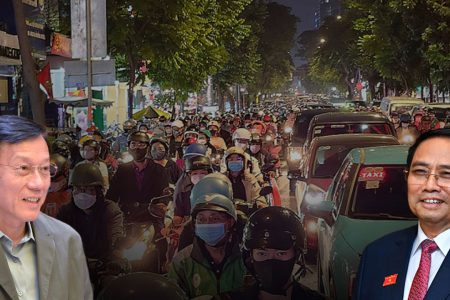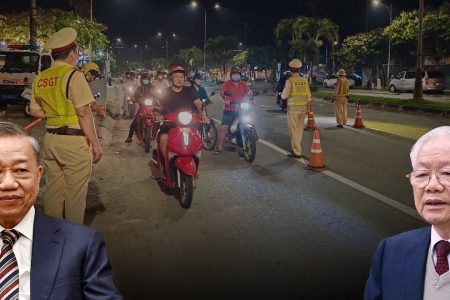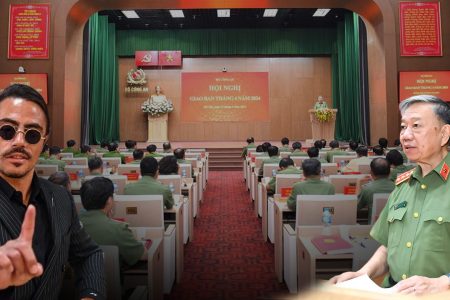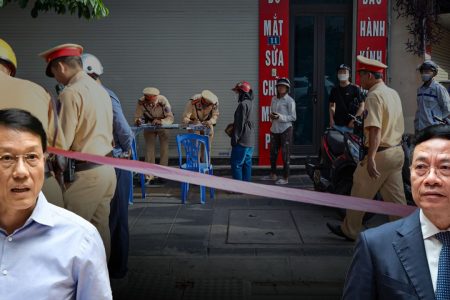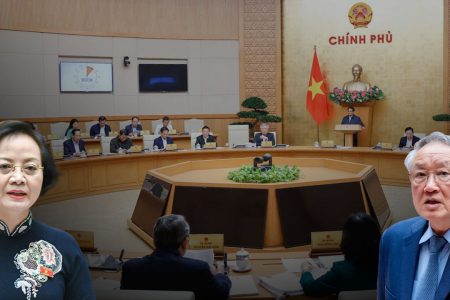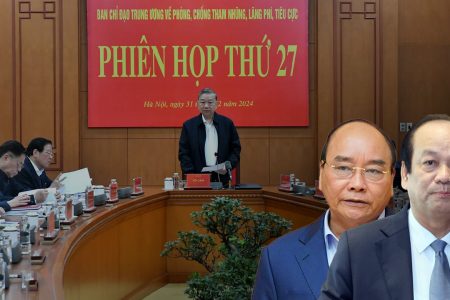It has been 36 days since the Supreme People’s Court issued decision of the cassation of the murder case in Cau Voi Post office in which all 17 supreme judges agreed to uphold the death sentence of suspected Ho Duy Hai. In the last more one month, journalists, lawyers and even legal experts in the state system have also been participating in the study of the case. The study, in order to prove to the 17 judges that the nature of the case was not only changed, but also completely different from the case files and the conclusions.
Public opinion is very specific, one is to prosecute the case that falsifies records where the main culprits are police investigators, the prosecutors who held the right to prosecute, and people who signed important procedural decisions.

Further, the mastermind embedded its hairy hand throughout the investigation, prosecution, and trial processes, until influencing the decision not to appeal the case, namely Mr. Nguyen Hoa Binh in the role of the chief of the Supreme People’s Procuracy, later continued to preside over the trial with a decision to challenge public opinion. The crucial sentence called “justice” in the ruling that “does not change the nature of the case” will inevitably go into the history of Vietnamese proceedings forever, hoping that on the tombstones of the this supreme judges will be bestowed with this unruly “sentence” for the Vietnamese people to remember.
Boldly, the public requests to change deterrent measures, that is, release Ho Duy Hai, or at least relocate Ho Duy Hai from the abominable and unlucky prison camp in Long An. The case of such an injustice through many levels naturally poses a threat to the safety of Ho Duy Hai and the public still questions why the lawyer is eligible to defend Ho Duy Hai like lawyer Tran Hong Phong has never been allowed to meet his client in the past 12 years. Perhaps no country has had a bizarre attitude like the the Long An’s temporary detention centers and People’s Procuracy. When the lawyer approached the case, he cannot access to the most important written reports which have been hidden mysteriously along with having no permit to to meet his client.
Strictly regulations of the Long An proceedings show that they are scared, a great fear, because they lileky understand that they could not hide for forever.
The state-run media also recorded 7 unusual deaths, which folk called sudden death of civil servants related to Cau Voi Post Office case.

The sudden death happened on the night of June 10, 2020, was of Mr. Tran Thanh Lam, deputy chief of Police unit in Nhi Thanh commune, Thu Thua district, Long An province. Mr. Lam, who was completely healthy, died at 22h after patrolling the commune police headquarters. After a loud noise at Mr. Lam’s bed, his colleagues running into the light turned on to find him still breathing but very weak and faded after a few minutes. Mr. Lam, only 38 years old, very healthy, died in a strange way.
Remember that this police station is directly in charge of the Cau Voi Post Office area, not far from that and the best place to understand the area, people in this area, especially for the double murder case in 2008 in which Ho Duy Hai is likely a victim of legal miscarriage. Police officers in Long An consulted the Cau Voi police the most. In 2008, Lam was the one who discovered the ash in Ho Duy Hai’s garden, leading to Hai’s allegations of burning evidence. After Mr. Lam’s discovery, Ho Duy Hai was urgently arrested, but then the results of the examination of the ashes discovered by Lam did not prove anything that Ho Duy Hai was the murder.
Previously, 6 had died suddenly, causing the case to be both ghostly and mysterious in the manner of those who know the most mysterious details of the death case. This is a folklore, but we need to understand that the truth of this case has not been clarified.
6 Persons involved in the case have died …
The first sudden death was the police officer of Nhi Thanh commune named Huynh Van Minh. Minh was the one who burned the cutting board and the important evidence knife of the case, suddenly died in 2009 while on duty at Nhi Thanh commune. This death is very similar to the recent death of Mr. Lam.
The second is of police officer Nguyen Thanh Hai in 2010 from a traffic accident right on the road from the provincial road to the headquarters of the People’s Committee and the Commune Police. Despite being a police officer, Thanh Hai played an important role in the case as a witness. However, his appearance in the case is very mysterious.
The third is of the chief of Police Investigation Agency of the province’s Police Department Pham Van Tien, who was a deputy head of case’s investigation team. Tien died suddenly in the headquarters of the province’s Police Department, right at a meeting in 2012.
The fourth is of lawyer Vo Thanh Quyet who was appointed legal adviser for Ho Duy Hai. Instead of defending his client, Quyet worked so his client cannot avoid being sentenced to death. Quyet used to be the head of the Investigation Agency of Long An province’s Police Department before returning to become the head of police department of Thu Thua district.
The fifth was of journalist Hoang Hung who wrote an article on Labor Newspaper “Detention of a suspect” in the early days of the case, the subject of detention was Nguyen Van Nghi. Afterwards, journalist Hoang Hung was burned to death by his wife, Ms. Tran Thuy Lieu at home on January 19, 2011.
The sixth is of senior procurator of the Supreme Procuracy in Ho Chi Minh City Tran Ngoc Lam. He was the prosecutor at the appeal hearing of Ho Duy Hai. The newspaper reported that Mr. Lam once told Hai Hai’s aunt and aunt: “Don’t blame me for putting death sentence on Ho Duy Hai, blame the person who instigated me.” Mr.Lam also advised Hai’s family to use legal service of lawyer Nguyen Van Dat because “this person is very good.”
Mr. Lam died suddenly in 2013, due to a stroke.
Those with legal expertise can still understand that Ho Duy Hai’s death sentence is still valid and the grounds for appeal to the second cassation are serious procedural errors, especially in investigation. Now the first opportunity has been stripped away by 17 supreme judges and the death sentence is hanging over Ho Duy Hai’s head.

The current record of lawyers sent to the National Assembly, the state President and the highest levels of proceedings are aimed at reopening procedure, as it is likely that the cassation procedure has been missed. So, what’s the difference between a retrial and a cassation procedure?
Although there are many provisions relating to these two special judicial institutions, it can be summed up that the basis for reopening is in the three words “new circumstances” that are undiscovered and not considered as facts at the previous trial stages. Whereas in the cassation procedure, the main basis is a violation of the proceeding, and those procedural violations are often made to distort the truth, more or less can make the sentence is changed in the content.
Legally, it can be seen that the Law is divided into Formal Law, that is, the procedure of procedure, and the Content Law, which stipulates specific circumstances giving rise to a legal consequence, ie punishment.
So, the cassation procedure stipulates the form, the retrial regulates the content, which is the most basic difference between these two supreme and special institutions.
The new facts are facts about the case that the previous judges have not yet discovered and do not know to identify the case. And these facts have the potential to change the nature of the case.
The most recent new are the grounds to prove that the left-handed perpetrator has committed the crime while Hai is right-handed.
Incidents about the happening on the first floor of the Cau Voi Post Office house;
About the fingerprints on the scene yet to find the object;
the shoe prints and shoe marks on a stainless steel chair do not match Ho Duy Hai’s foot size;
about the newspaper the perpetrator dropped;
about the ridiculous experimental scene image that is ridiculous.
Especially, a series of written files were removed from the file, including all the written records of interrogation of important people crucial to the ability to track down the culprit and prove the alibi of defendant Ho Duy Hai.
Once the case investigation is completed, all the details must be connected together by a smooth logic of the nature of a continuous logical and natural chain of cause and effect. An investigative conclusion raised by a series of questions certainly could not describe the comprehensive truth and the possibility that the truth had been distorted …
Particularly for shortcomings that led to the losses of material evidences, deform blood samples, and the indictments describe in reverse the testimony of witness Dinh Vu Thuong, surely investigators and procurators must be prosecuted for the wrongdoing which led to misleading case file.
The deliberate delay and pretend to be deaf and dumb of the Long An proceedings when failing to respond to Ho Duy Hai’s family’s request to prosecute for falsifying records from many years ago, is the act of not acting against criminal activity, as defined in Article 369 of the Criminal Code: “Crime of not investigating criminal liability of sinners.”
No one can be so naive as to lose a lot of important evidence like they did in the case. This can only be a trick to intentionally conceal the truth for the perpetrator and take the life of the innocent.
Thoibao.de (Translated)







